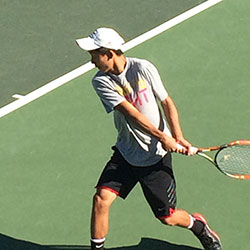From the middle of April to the beginning of May, recruits in all three NCAA divisions, who did not sign early or get admitted early decision, either sign the National Letter of Intent or send in a deposit committing to a college or university. Recruits for 2014 have all made their decisions… now what?
Players’ success, or lack of success, on a college team depends primarily on how committed they are to their new programs and how hard they are willing to work in the next 4 years to grow and develop as a person and player. Recruits tend to go in one of two directions after making their commitment to a college tennis program. Some celebrate the fact they achieved a longtime goal of playing tennis, sense that the hardest part of pursuing college tennis is over, and take their foot off the gas pedal in terms of their dedication, work and commitment. Other players look at their selection of a school as the beginning of an exciting and challenging journey to be the best college player, competitor and teammate they can be. Those players redouble their commitment to hard work on and off the court.
Being a 4-star, 5-star or blue chip recruit does not insure success at the college level, just as being a 1-star or 2-star recruit does not insure four years on the bench. It is not uncommon for coaches to share examples of how they have a former 1- or 2- star player in the starting line-up and a former 4- or 5-star player on the bench, for example. Much can unfold in the years after a player commits to a college in terms of developing physical and mental skills, maturity, confidence, strength and experience. Those who tend to be most successful in college tennis share a positive attitude and drive and are open to further learning, development and new goals.
After committing to a college, it is recommended that players take the following steps to best prepare themselves to join their new team. Following this checklist helps to insure that recruits start off on the right foot when they step on campus in September.
- Stay in touch with the Coach. The more of a relationship a player continues to build with the coach over the upcoming months, the more comfortable the transition to the team will be. Check in with the coach occasionally about…
- Continuing developments in tennis (and schoolwork)
- The college team’s spring season as they compete (keep an eye on their websites and Facebook pages!)
- What expectations the coach may have in terms of training, playing, fitness routines, parts of the game to work on and develop, etc.
- Start building a relationship with future teammates. Ask the coach for contact information of the players who will be returning, as well as other recruits who have committed for the fall. Touch base with future teammates to start to get to know them and share stories and experiences. If any team members are geographically close, set up some times to hit or train together, or even play some doubles or head to a summer tournament together.
- Avoid the senior slump! Even though acceptance to college is done and there is the temptation to relax a little bit, keep focusing on schoolwork. Keeping up good study habits will prepare a player for college studies and will make sure to not raise a red flag with the coach and college about the level of commitment to doing well.
- Keep training and competing. Even though players are already committed to tennis programs, coaches expect recruits to come in improved and ready to play, hopefully making a positive impact on their line-ups. And, it is important for players to feel confident and well-prepared to fill their new roles. Sometimes players will say, “Well, now that I’m in to college I don’t have to play tournaments anymore.” While it is understandable that playing the same old junior tournaments might get a little stale for some, continued tournament competition is an important component in the improvement of any player. While it may not be necessary to keep the same intensive tournament schedule as during the recruitment process, there are still ways for players to get good “match play” preparation which is important for college tennis…
- continue to play some USTA and/or ITF junior events
- consider playing some USTA adult open tournaments
- look into competing in the ITA Summer Circuit
Four exciting years await the college tennis recruiting class of 2014. Start preparing now to make the most of it.
Donovan Tennis Strategies
Donovan Tennis Strategies has been helping prospective college tennis players and their families navigate the recruiting process since 1997. In addition to consulting services DTS runs two College Prospects Showcases to help players get exposure to college coaches.



